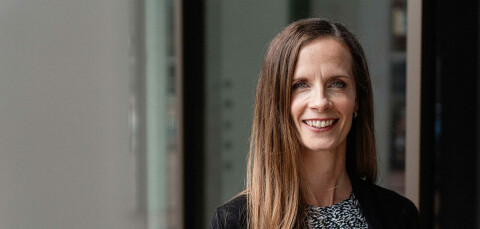
September 15th 2023
Sharing your experiences makes you feel less alone
- Employment best practice
- OF THE
- Support base
- Partnership
Not being able to use your native language in your work is no small feat. Australian Vikki Wardley knows all about that. And she is not the only one who sometimes struggles with Dutch. That is why Vikki, team manager at Sweco, started the foreign language network. “This way, non-native speakers come into contact with colleagues who encounter the same problem. That makes them feel supported.”
Please note: this article was translated using a translator appOnce every three months, foreign-speaking Sweco colleagues meet. They talk about their experiences with the Dutch language in their work. What are they up against? How can they help each other? What do they need from the organization? And from colleagues? The network is an idea of her manager Marco Leepel, and Vikki is the driving force behind its implementation.
When she came to the Netherlands during a trip through Europe, it was love at first sight. “My friend said: we can live here,” says Vikki. I thought about my job in Australia, and how I didn't speak Dutch at all. But a few days later I said: let's do it. If it doesn't work we can always go back.” She has now lived here for thirteen years.
But those early days were not always easy, she remembers. She would have preferred to work directly for a company where she could practice her own profession. But the language barrier stood in the way at the time. Vikki made a compromise: she went to work for an English-speaking oil and gas company. Vikki committed herself to learning Dutch and practiced her speaking skills as much as possible. “I had stuck a poster on my chair for colleagues who wanted to speak to me: 'Please talk in Dutch, please!' it said,” she laughs. And then the moment came when she thought her Dutch was good enough and dared to take up the challenge. “I wanted to work at an international engineering consultancy firm in infrastructure and that's how Sweco came my way. I met Marco through an open application and he hired me. He thought it would be an added value to have me in management. A diverse team is representative of Sweco.”
On the brakes
Vikki is not always able to express everything she has in her head and feels in her heart. “It feels like you have to function with one hand tied behind your back,” she says. “When I talk 1-on-1 with a colleague, things go well. Despite the mistakes I occasionally make, the other person understands me well. And I ask what someone means if I don't understand something.” She also dares to put on the brakes when a conversation is going too fast. And she checks whether she has understood the other person correctly by repeating and summarizing. It is mainly the group conversations that remain difficult. “The more people join the conversation, the harder it is to follow. And because you're so busy trying to understand what's being said, sometimes the topic is over by the time you've formulated your response,” says Vikki.
A special toolbox has been developed that makes conversations easier for non-native speakers, and Dutch colleagues receive tips and insights for conversations with non-native speakers.
In conversation with non-Dutch speakers? These tips help:
- Speak calmly and check whether the other person has understood you
- Avoid using metaphors and sayings
- Use something visual in a presentation
- Provide a clear agenda for meetings
- Invite someone to ask questions
More balance
It is not only the language that non-native speakers have to get used to, the Dutch culture also has its typical characteristics. Vikki remembers a workshop she participated in. “An actor played an angry team leader, and we had to raise a hand if we thought she seemed aggressive,” she says. “I was the only one who immediately raised my hand. In Australia it is unthinkable to express your frustrations.” Exactly the same applies to giving feedback in Australian culture: “You make sure you don't make the other person feel bad,” says Vikki. “The only thing that doesn't work for the Dutch is that they don't realize that they have done something wrong.”
What Dutch culture excels in, Vikki believes, is the work-life balance. “In Australia, as a manager you are trying to get the most out of your team. Working overtime is just expected and everyone does it.” Here she asks very different questions to people who work overtime: How come you worked overtime? Do you need help? “At first I was surprised that there is no one in the office here after 7 p.m. and on Saturdays,” says Vikki. “Sweco is important, and we take our work seriously, but we also take time for other things. Like your family. There is more balance here than in Australia. I think that's a better way to live.”
Supported
The foreign-language network ensures that foreign colleagues feel less alone within the organization. “I often hear that they thought they were the only ones struggling with problems caused by the language difference. And then they come into a group of people who encounter exactly the same thing. That makes them feel supported.” Vikki also thinks that team leaders also have the task of effectively communicating the needs of non-native speakers to the rest of the group. Creating understanding and then explaining how Dutch people can help non-native speakers is important. Once the penny has dropped, all is well.
This article is a shortened version of the article on the Sweco website.